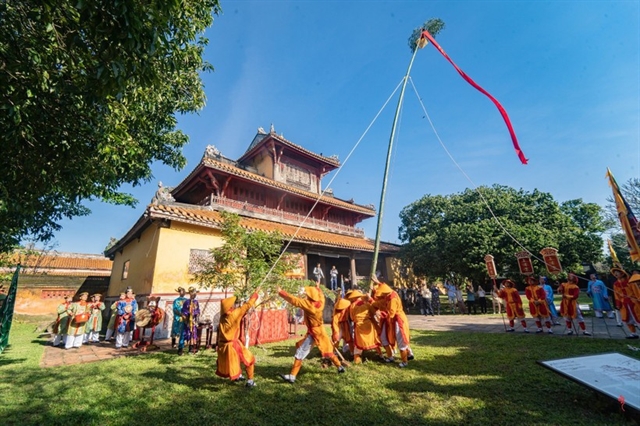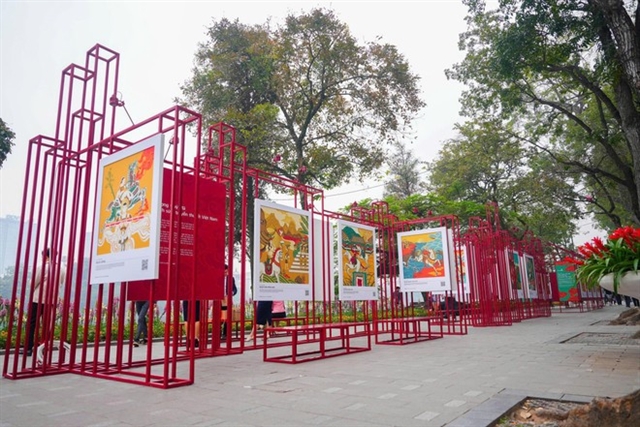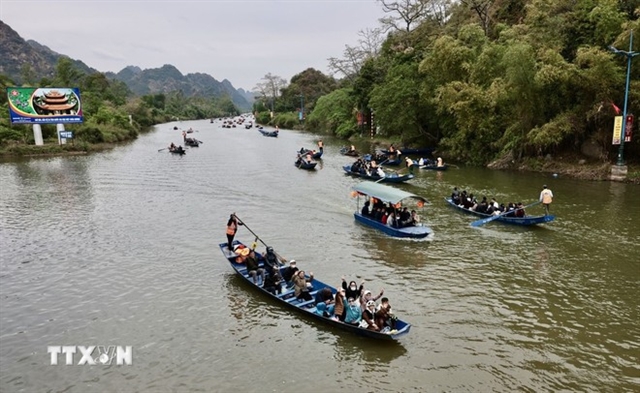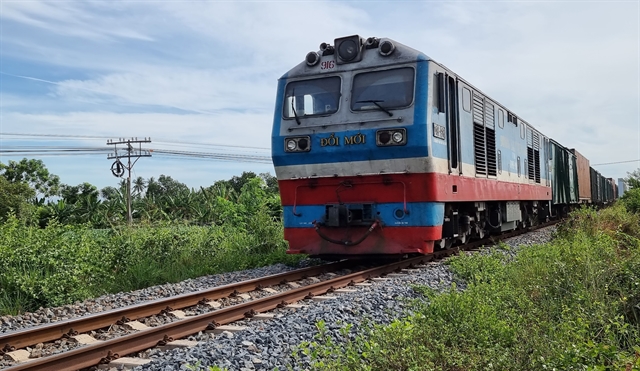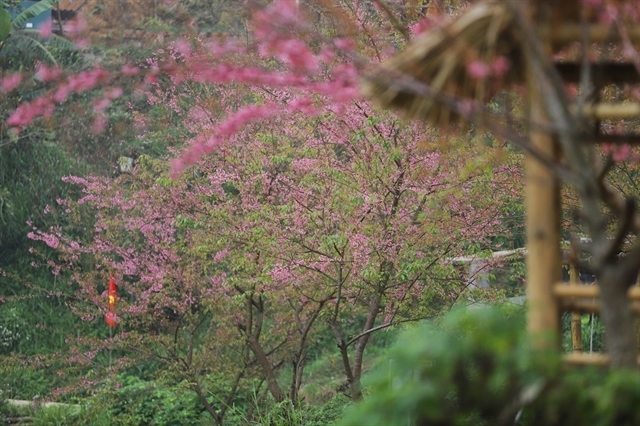 Features
Features

By Công Thành
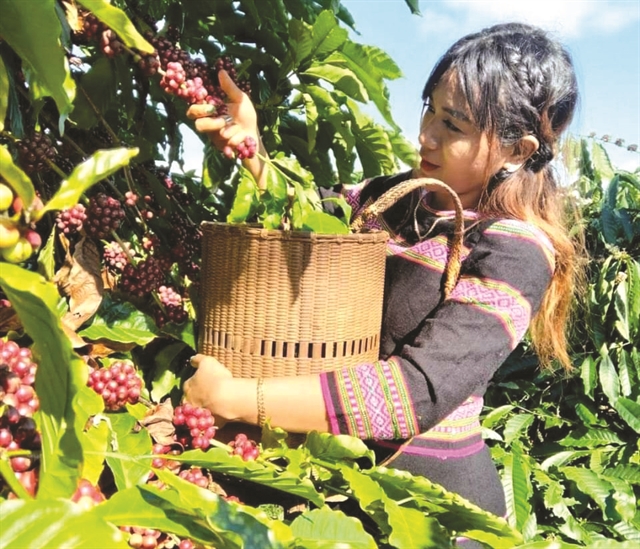 |
| An ethnic woman collects coffee beans during harvest time at a farm of Dano Farm co-op in Quảng Sơn Commune of Đắk Nông Province. The multi-ethnic community began ‘green’ farming for high-value crops. Photo courtesy of Dano Farm |
Around 30km from the road of Gia Nghĩa township in the Central Highlands province of Đắk Nông Province, a community of 41 ethnic groups in Quảng Sơn Commune has been building high-valued farms with exportable crops at Dano Farm – the first ‘green’ agro-forestry co-operative of a multi-ethnic community.
The ethnic community had grown 117ha of coffee and 42ha of mulberry for silkworm raising. About 37 households joined organic farming practices in 2018.
Dano Farm co-op is a trailblazer in building an organic brand – Rock Way coffee – that attained the UTZ certification programme (UTZ certification signifies ‘good coffee’ and was launched in 2002 by a Guatemalan coffee farmer and a Dutch roaster who wanted to bring coffee certification to a global market and spread the impact of sustainable farming practices worldwide) in Đắk Glong District.
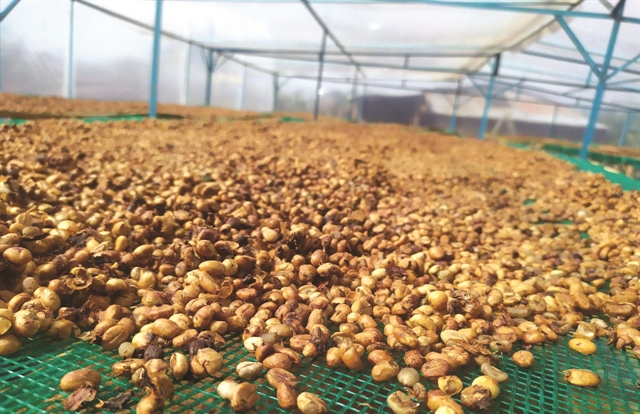 |
| Coffee beans are processed at a factory at Dano Farm. The organic coffee brand attained exportable quality after years of applying standard production. Photo courtesy of Dano Farm |
Local farmers were guided to ferment fruit, fish and silkworm waste for fertilising coffee trees reducing 60 per cent of input cost instead of chemical fertiliser.
“The brand highlights the co-existence of different ethnic groups such as the Mông, M’Nông, Dao, Thái, that were mostly emigrants from the northern mountainous region for decades,” said the director of Dano Farm, Tạ Thị Liên.
“They had ‘zero’ experience and knowledge in the standard process of organic farming while hesitating to start sustainable production. We persuaded them to practise organic production, creating high-quality, safe farm produce for a healthy community.
“The first pilot organic certified coffee was priced 25 per cent higher than previously. Farmers saved 60 per cent of production cost by using bio-fertilisers made from fermented fruits, fish and silkworm waste.”
Liên said organic farming needed time to perfect, so safe coffee output accounted for 1.6 per cent of total production at Dano Farm.
Silk
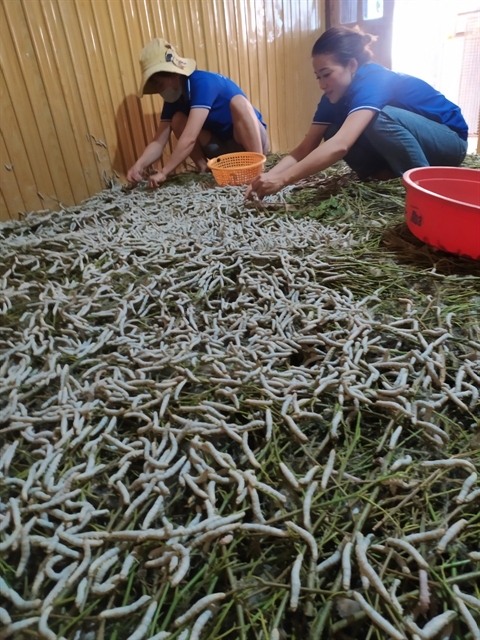 |
| Members of Dano Farm feed silkworms with mulberry leaves. Silk, coffee, medicinal herbs and community-based tourism will set up sustainable growth for ethnic groups in Quảng Sơn Commune. Photo courtesy of Tạ Thị Liên |
Ethnic groups in Quảng Sơn Commune still preserve their traditional weaving, culture, arts, cuisine and fashion, but the unique culture is only shown at the annual festivals of the Mông, M’Nông, Dao and Thái people.
“Sericulture will help ethnic groups promote weaving craft to make valuable fabrics, while more crops can be used during other times. Farmers can earn more from raising silkworms after harvesting the coffee, pepper, macadamia, avocado and livestock,” Liên explained.
She said 1 hectare of mulberry trees, whose leaves are used to feed silkworms, could provide food for producing 800kg of silk cocoons, and sell for VNĐ160 million (US$7,000).
“The co-operative has been seeking partnerships with other local farmers for expanding the mulberry area in building a stable material source for silk production,” Liên said.
Silk and handloom fabrics will be a product of community-based tourism, traditional festivals, food fairs and crafts.
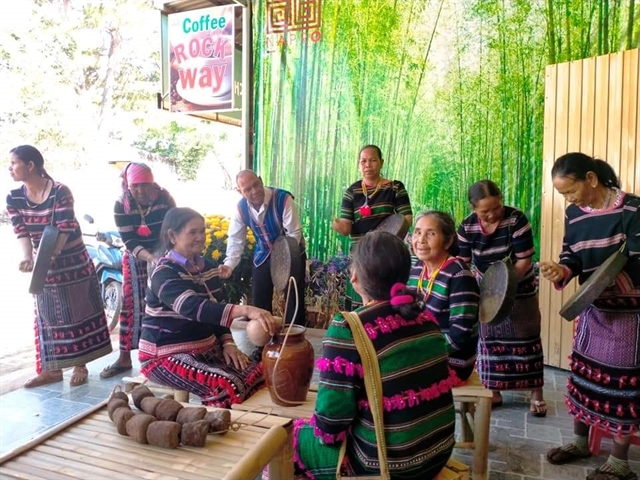 |
| Ethnic women at Dano Farm gather in a farm produce promotion event in Đắk Nông Province. They are weavers of silk fabric and brocade fashion. Photo courtesy of Giàng A Lỳ |
H’Mai, 80, a M’Nông woman, said handloom weaving was an ancient craft among women in the community as almost all the local women could make their own clothing.
“We could show our daily work to tourists when visiting our community. They will get experience from weaving, cooking traditional foods, and jungle trekking. Each ethnic group will show off their culture in hosting visitors,” she said.
Giàng A Lỳ, an immigrant Mông from the northern province of Lai Châu and a member of the co-operative, said his own 3ha of land was for vegetable and livestock farming and to host a food festival.
Lỳ said a series of daily activities of local people could be shown to visitors, such as musical performance, handicraft and farming.
He said community-based tourism would help promote coffee, silk, farm produce, and handmade products of local people.
The Mông man said different ethnic groups assigned teams of cuisine, weaving, jungle trekking, and farm living.
Giàng Thị Dẻ, a Mông weaver, said farmers would benefit from a 40 per cent share of silk cocoon sales as the co-operative covered the cost of seeds, fertilisers and technical assistance.
She said a female worker could process 140kg of cocoons, and have an income of VNĐ8 million ($347) per month.
Dẻ said local farmers could earn more from livestock, macadamia, pepper and garden medicinal herbs.
The local weavers had been building links with famous silk brand villages in the Mekong Delta province of An Giang and Vạn Phúc silk village [in Hà Nội] to produce pillow covers, bags and fashionable outfits.
“We plan to build an environment-protecting ecological system, in which the exportable coffee certified brand will play a key role,” Liên said.
“The ecology-based farming will help boost the value of different crops while offering protection for each other. Farmers earn more in the same area and avoid the risk of dumping produce in bumper harvests."
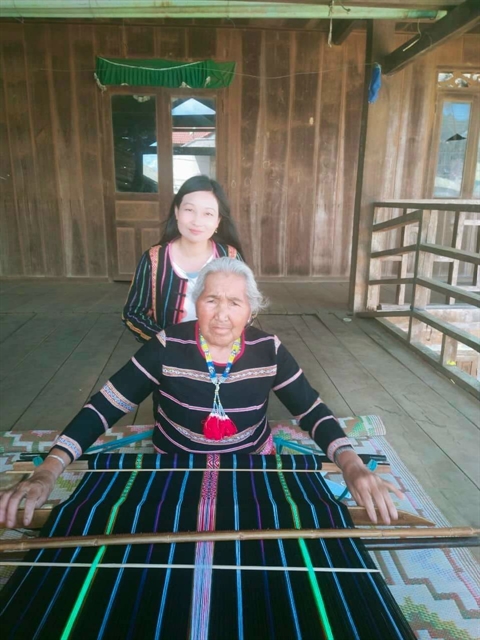 |
| A M’Nông ethnic craftswoman works on a handloom in Quảng Sơn Commune in Đắk Glong District of Đắk Nông Province. Photo courtesy of Dano Farm. |
“However, our main target focuses on how farmers themselves invoke the ‘green and safe’ agro-forestry production that helps them use better farming methods, grow better crops, generate more income, improve working conditions, adapt to climate change, and protect the environment," she said.
“They (ethnic farmers) will be masters of high-value farming and build prosperity from generation to generation in the Central Highlands. They will become rich from their safe and green crops.” — VNS

